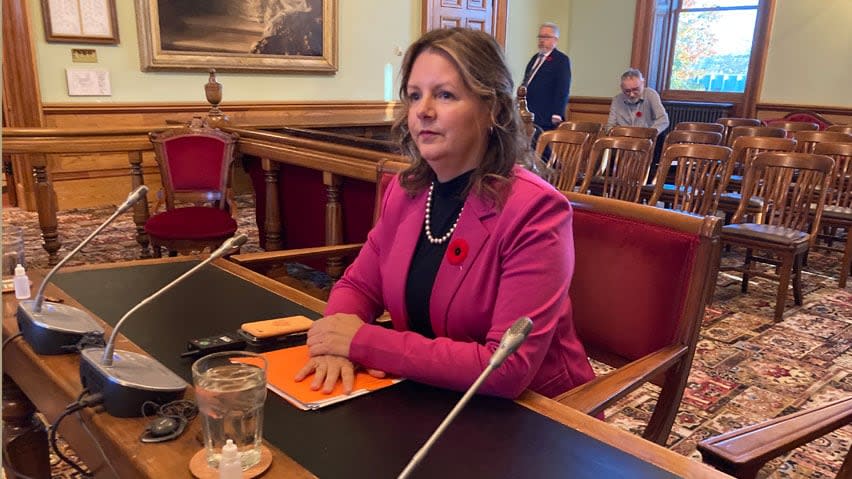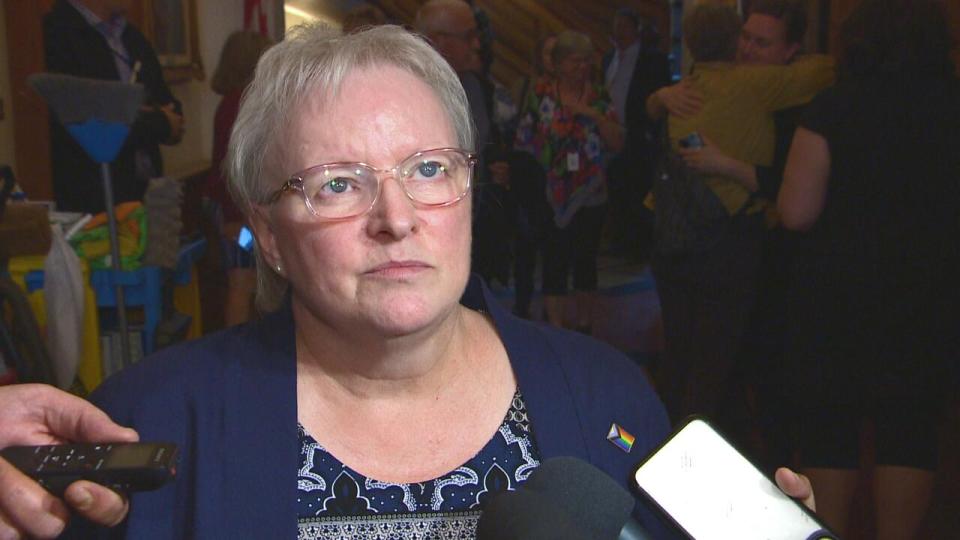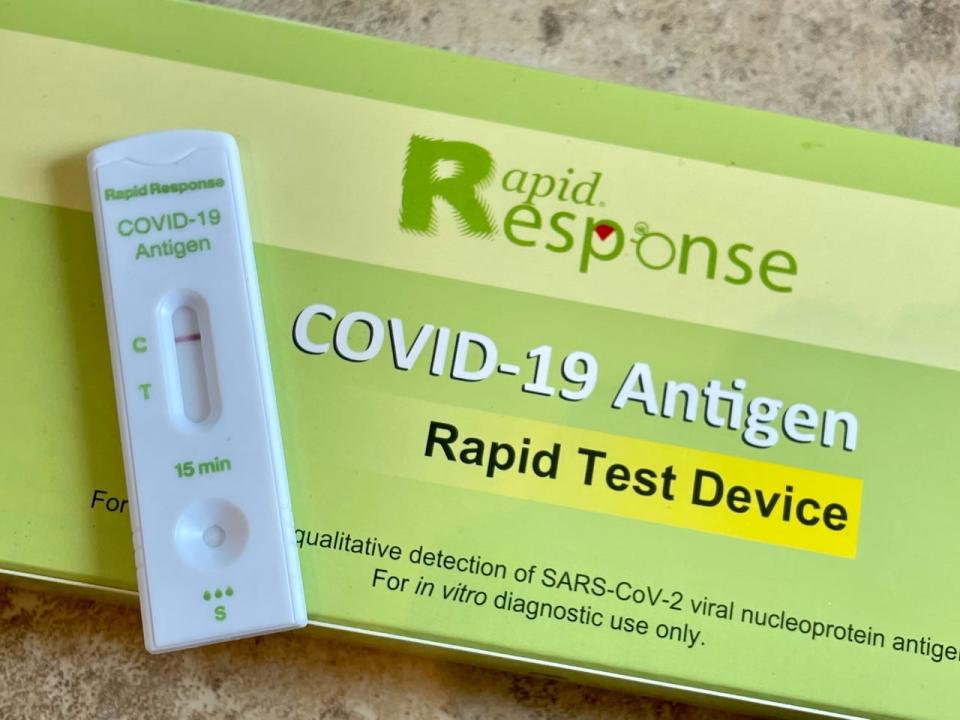Auditor general flags lack of evidence-based records to back COVID decisions

The Department of Health was unable to provide evidence-based documentation to substantiate 33 Public Health decisions made during the COVID-19 pandemic, Auditor General Paul Martin says in an audit released Thursday.
The audit covered key operational areas that were meant to reduce the spread of COVID-19, including testing, contact tracing, contact management, and infection prevention and control guidance.
Martin said the department "had numerous systems and procedures in place that were designed to reduce the spread of COVID-19," and went "above and beyond to support New Brunswickers."
But he found "areas for improvement should the need arise," according to Volume 2 of his annual report, which includes chapters on pandemic preparedness and responses between April 1, 2020 and March 31, 2022, by the Department of Health, Department of Justice and Public Safety and Department of Education and Early Childhood Development.
He made a total of 18 recommendations and the departments agree with them.
Hotel isolation program cost more than $5.4M
In his first volume on the government's pandemic response, released in September, Martin found problems with the level of preparedness, the decision-making process, record keeping and communications.
As part of the next volume on the COVID response, Martin found the Department of Justice and Public Safety's hotel isolation program, cost taxpayers more than $5.4 million and only nine travellers tested positive for COVID-19.

The Hyatt Place in Moncton was one of several hotels across the province that had a designated area for isolating travellers. The program, overseen by the Red Cross, included guards and contactless food dropoff. (Kate Letterick/CBC)
The program, implemented in May 2021 to reduce non-essential travel and operated by the Red Cross until the end of June 2021, required leisure travellers to self-isolate at an isolation hotel at their own expense for at least seven days upon return to New Brunswick.
The department doesn't know whether the program decreased travel or mitigated COVID-19 risks, he said, because it didn't have clearly established goals and didn't review the outcomes.
Students lost 17 weeks of learning
With the Department of Education, Martin found students lost about 17 weeks of learning time because of school closures due to COVID-19.
Virtual learning training provided to teachers at the district level was ad hoc, he said, and the teachers, in turn, were tasked with training students on how the technology worked. There was no centralized co-ordination or oversight by the
department; "thus, no way for them to know how well things were going or where the gaps were."
While the department has evaluated and reported upon various aspects of the pandemic response plan, it has not performed an after-action review, and has no plan to, said Martin. He found "opportunities for improvement" in the areas of planning, training and communication, to better prepare the education system should future disruptions occur.
'Key' COVID decisions with provincewide impact
For the Department of Health review, Martin's office selected a sample of 33 recommendations from the Office of the Chief Medical Officer of Health and asked the department to provide evidence-based documentation to substantiate the decisions, he said during a presentation to the legislature's public accounts committee.
"The department was unable to provide requested documentation, acknowledging that they 'did not create a compendium or a repository of all of the scientific articles, papers, publications and analyses it consulted during the pandemic and therefore we cannot provide a fulsome and detailed list of all of the evidence consulted and used when recommendations were being formulated.'"
On the other hand, the department was able to provide evidence to support 31 of 35 infection prevention and control policy decisions, which Martin described as being related to internal operations rather than "public-facing" like the 33.
These records should be retained. People want to know — you, the public, they want to know that Health was being heard in their decisions that were being referred to government. They want to know there was no political interference. I have no evidence that there was, or wasn't. - Paul Martin, auditor general
Martin did not provide details about what the 33 decisions were, what percentage of decisions they represented, or why his office chose to focus on them.
Green Party health critic Megan Mitton said she found the lack of evidence provided by the department "extremely concerning" and asked about the nature of the 33 decisions.
Martin replied saying, "Normally, we don't get into all the details." But generally, they were "key decisions" that had provincewide impacts, he said, citing border closures and masking as examples.

Martin found in September that the Office of the Chief Medical Officer of Health was at the bottom of New Brunswick's COVID-19 pandemic decision-making hierarchy, but Dr. Jennifer Russell, who resigned, called that a 'misconception or misperception.' She participated in high-level meetings, she said, but ultimately it was cabinet that made decisions. (Jacques Poitras/CBC)
Liberal health critic Rob McKee questioned whether Martin was able to "dig deeper," and asked specifically about what he described as "one of the most high-profile decisions the department faced scrutiny for" — the lifting of masking rules in March 2022.
Dr. Jennifer Russell, who was chief medical officer of health, cited a study at the time, but internal emails subsequently made public showed she was seeking evidence to back up the decision days after it was made, McKee noted.
He asked whether Martin was able to review emails and whether it's possible some decisions were not based on evidence.
"We're looking for evidence that supports the decisions made and when there's no evidence, all we can do is state the fact to you," said Martin.
He hopes the committee will hold the department accountable, he added.
"I hope that this won't happen again. It's not appropriate.These records should be retained. People want to know — you, the public, they want to know that Health was being heard in their decisions that were being referred to government. They want to know there was no political interference. I have no evidence that there was, or wasn't. The evidence isn't there."

Former Health minister and Tory MLA Dorothy Shephard said the department made decisions based on the best information it had at the time. (Ed Hunter/CBC)
Former Health minister Dorothy Shephard told reporters she was surprised that the department didn't keep track of those documents.
"I'm not saying they're not there because as I said, everything was moving very rapidly. One decision was made, the next one came right on it, and that kind of stuff just went through," the Tory MLA said.
"I do have to say that I'm fairly confident, very confident that the information that Public Health gave us was validated by them," she added, suggesting a "broader scope of a discussion" about how decisions were made is in order.
Public inquiry raised
Mitton asked Martin if he thinks New Brunswick needs a public inquiry.
"Would that maybe capture everything that needs to be captured and maybe be able to have the scope needed to dig into things that maybe your office wasn't able to or isn't able to?"
"I couldn't comment whether an inquiry would help or not. That would be a decision amongst yourselves and those in government," replied Martin.
McKee quickly followed up, asking if Martin felt limited by legislation.
"I'm just wondering if … there's information that we want to dig deeper, is it somewhere else that we have to turn to?"
Martin said he feels he has enough access. But it doesn't matter how far he digs — if the evidence isn't there, it isn't there.

The Department of Health was unable to ensure COVID test kits were provided when and where they were most needed, the auditor general found. (Alexandre Silberman/CBC)
The audit revealed a similar problem surrounding the 300 compassionate travel exemption requests received by the chief medical officer of health.
There was a lack of established criteria to ensure consistent application and transparency of decision-making, according to the report, and 36 per cent of the exemption requests tested by his office did not have a documented rationale for the decision.
While the department had established performance metrics, such as testing turnaround times, outcomes were not monitored or reported upon.
In addition, a lack of inventory-monitoring systems contributed to the department being unable to ensure supplies were provided when and where needed most, said Martin, citing periods of high demand and rural locations as examples. More than 17 million tests were were distributed as of January 2023, he said.
Department will ensure 'enhanced record keeping'
The auditor general made seven recommendations for the Department of Health. Among them: ensure the development and retention of adequate documentation to substantiate Public Health measures. The target date is listed as "ongoing."
In its response, the Department of Health said it agrees that documentation related to meetings and decisions should be "reinforced to ensure greater transparency on the decision-making process during health emergencies" and will ensure that "enhanced record keeping practices are integrated into its health emergency operations."
Martin also recommended the department ensure decision criteria are established and consistently applied for any process that may result in exceptions for adherence to mandatory orders, and that the rationale used for decision-making for exemptions is well-documented.
Data-systems capacity should be increased, he said, to adequately monitor test inventory during a pandemic to ensure supply meets demand.
Other recommendations for the department include:
Develop, monitor and report on established key performance indicators. Targets should be regularly reviewed for ongoing relevance and revised accordingly.
Provide clear targets to support the decision-making process when moving between various phases of a staffing crisis action plan. This should form part of an up-to-date pandemic plan.
Develop a contingency plan, as part of the business continuity planning, that outlines backup procedures for key personnel, both at the department and regional levels.
Review the efficacy of the critical care nursing initiative to determine if it accomplished its intended objectives and note any future improvements should the need arise again.

